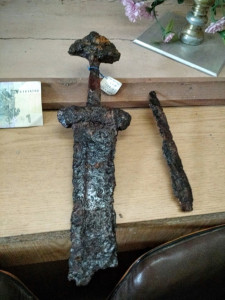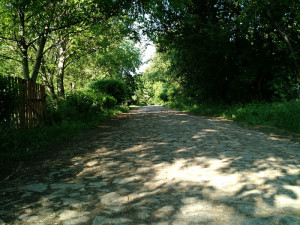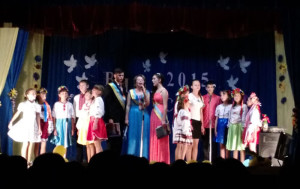It’s not easy to get to Ukraine. You have to want it. A few weeks after I began dating my girlfriend, Alona, she started asking if I would ever take a trip home with her. I fell in love and my fate was sealed; six months later I was on my way to a small village in central Ukraine.
Getting There
The trip began in a taxi to an Amtrak station at home in Norfolk at 4AM. The train took us to DC where we took an Uber to a hotel and stayed overnight. The next day we rode the shuttle to the airport and flew to Amsterdam and then to Kiev in Ukraine. The flights were long but bearable. If you go straight to the village from Norfolk it’s about a 26 hour trip, all told.
Once we arrived in Ukraine I immediately noticed the reserved nature of the Ukrainian people. They quietly went about the business of disembarking the plane, making their way to the baggage claim, and waitng for their luggage to appear. It was almost eerie how silent they were; as if the scene were being directed by a German expressionist filmmaker.
After claiming our luggage and walking right through customs without so much as an eyebrow lifted by the agents, who simply intercept people at random, we were greeted warmly by Mama Luda and were on our way to the village of Dzenzelivka.
The ride was about three hours long and included a detour to another village by our driver, Papa Igor, who wanted to see if anyone was fishing. My bladder did not appreciate this, especially as no one was fishing and the village roads can only be described as primitive. They are a combination of ancient dirt and confused rocks that would be considered ridden with potholes if you could find a stretch that didn’t have any.
After taking several such “roads” we came across a large, well tended field with a commanding presence resting upon a cinder block, seemingly waiting for us. My companions started talking and Papa Igor pulled over. It was Baba; Alona’s grandmother. She saw us coming and locked her gaze, pulling us in like a tractor beam. We found ourselves walking through the high grass towards her and were soon hugging and answering her questions. Out of no where, like an elderly ninja, Deed, Alona’s grandfather appeared. Then another villager, and another. Others drove by slowly, getting a good look at the strange import. After a short visit we were granted our leave with the promise that another, extended visit would follow.
Mama Luda’s House
Lovely and warm, just like its owner, the house was immediately a comfort and a sanctuary. Throughout my stay I would always feel as though I could truly relax there.
Villagers in Ukraine typically live in what we might call family compounds. One or more small houses are located behind a fence or gate, along with other buildings which vary depending on the needs of the family. Mama Luda has a house with a detached garage used both practically and socially by her son Siroga and, at times, seemingly half the males in the village. There is a summer kitchen with an underground storage room which doubles as a natural freezer. A barn houses chickens, ducks, wheat, chemicals, and everything else needed for farming and maintaining the livestock. A small stump with an axe planted neatly at its center marks the final destination for said livestock who are routinely fed next to it. Macabre.
Beyond the compound lies Mama Luda’s “garden”. This is anything but a mere weekend affair. Acres and acres of fully planted fields stretch out to the horizon, are intersected by Lenin Street (really), and continue down the side of a picturesque hillside. Primarily a potato farmer, Mama also grows strawberries, cucumbers, lettuce, cabbage, dill, onions, and garlic, to name a few. On our second day I found myself in the fields weeding happily at 5AM. When you don’t have to do farm work every day it’s really quite enjoyable. I did some type of work in the fields nearly every day I was there, whether it was harvesting strawberries, hoeing, or pulling an evil weed called oset, which grows more quickly than any other plant and bristles with thorns. There is a meditative quality to repeatedly performing any simple action, and immediately seeing the results of your labor is very rewarding. The word quickly spread around the village that the American was seen hoeing at 5AM and I didn’t mind that one bit.
Life In The Village
Like any farming community, a part of each person’s day revolves around tending the crops and livestock. Mama Luda was often up and about early in the morning feeding animals and checking the garden. A typical day consists of a few hours of work in the morning and then again in the evening, during the cooler hours, while the warmer midday is spent inside their remarkable cool dwellings. I never saw an air conditioner in a house but I was never hot in one; cold sometimes, but never hot.
Trips to the markets are frequent, as stocking up on store-bought items is rare due to the expense and tendency for things bought from stores not to last. Men hold jobs, though the workday is…flexible. Women typically stay at home, though nearly all of the women I met did some sort of work on the side to bring in extra income. This often involved selling produce, working at a school or small shop, or hairdressing. Everyone seemed to have very flexible schedules. Folks would just show up randomly and say they weren’t working any more that day. When paychecks come, people sometimes don’t work for several days. For a country with so much to be done, no one seemed in a big hurry to do it.
While that work ethic may mean street lights don’t work and buildings are in general disrepair, it does have the benefit of contributing to a stronger sense of community and a less stressful day-to-day. I never saw anyone check a calendar or plan a meeting for the next week. Everything either happened right then or… later.
There was very little talk of the simmering war with Russian-backed rebels in the East, at the time still in an un-easy cease fire. You could tell that it weighed on people, but it seemed distant and of less concern than daily life. The conflict had been going on for more than a year when I arrived, so perhaps they were just weary of discussing it.

Shopping
Dzenzelivka has three general stores. Each carries a wide variety of products but all have small selections. Think of a 7-Eleven but instead of Slurpees they have shoes and instead of hotdogs they have a smattering of sausages and dried fish. One of the stores was newer than the other two and was clearly the most popular in the village and for good reason. It had a better selection and the employees were actually friendly; the level of customer service in Ukraine averages somewhere between very poor and insulting. It’s not unusual for an employee never to look a customer in the eye during a transaction. I’m not sure why this is. When speaking with someone one-on-one everyone I met was warm and friendly, but towards each other in casual interactions they are cold and callous. There is a lot of “put your head down and go about your business” in Ukraine.
Every Saturday in the nearby town of Mankivka there is a bazaar. The normally empty streets are filled with vans, cars, tents, and street vendors of all types selling everything from baby clothes to imported designer shoes. We visited the bazaar on the hunt for a christening gift for Alona’s goddaughter and I was surprised to see how uncomfortable she and Mama Luda were. They were visibly nervous and darted from one area to the next, trying their best to finish as quickly as possible.
I can’t speak for Mama Luda, but this is not normal shopping behavior for Alona. We once spent half a day looking for silver shoes for a wedding, which we never found. She had already looked several times on her own with no success. They were to wear under a bridesmaids dress that was so long no one could see her feet. She ended up wearing tan colored shoes and, shockingly, the wedding went forward as planned. I digress.
Prom
After the bazaar we attended what they refer to as “prom”, but what we would know as graduation. Three of the four students who made it through their senior grade, 11, were present and performed an elaborate two hour ceremony that included comedy routines, songs, dance numbers, and innumerable speeches by everyone from the principal to the mayor to possibly every teacher in the school. To bolster their numbers, the supporting cast was filled out by dozens of lower grade students and one drunken music teacher who had pre-gamed at the wedding next door and literally couldn’t say enough about the graduating students. I didn’t time it because I kept hoping it would end, but I’m guessing she spoke at least 15 minutes. Then she sang a song. Then she spoke some more. Later, whenever another song was performed, she would appear and join in. I do not believe this was planned. I was told that normally the entire village turns out for prom, but because so few students were graduating and there was a wedding next door, only about half the village came, including the bride and groom who stopped by to observe briefly.
The Christening
I had never attended a christening in person before, for any religion. Growing up Southern Baptist meant I saw a few baptisms, including my own, but christenings were a strange and foreign event performed by Italians and the people who liked to hug at the end of the preaching.
Ukraine is a majority Orthodox Christian country, especially in the villages, as evidenced by the complicated crosses seen along the roads, in homes, and around the necks of nearly everyone. The ceremony was about thirty minutes long and the father performed it with the same tone and enthusiasm of a telemarketer reading from a script, but faster. At varying points the baby is passed around, disrobed, passed around again, dipped and washed in warm water, and the passed around some more. The four godparents (cooms and coomas) took turns with the child and at one point in the ceremony turned around and spit three times each. I’m not sure what the purpose of the spitting was but it certainly broke up the monotony. After the ceremony was over the godparents went to the father and paid what appeared to be a lot of money and then more for what looked like souvenirs. It was amazing how quickly he went from holy man to street vendor.
Baba
A force of nature in the village and especially in her own family, Alona’s Baba is the picture of a Ukrainian village grandmother. She is so deeply tanned that any area not a deep shade of burnt sierra looks like a skin graft from an albino. She wears comfortable, worn-in dresses and a head scarf and her thick, round hands are hardened by years of work in the fields. She is inquisitive and quick to laugh, and I enjoyed our visits with her. I asked her how long her family had lived in the village and she quickly replied “forever”, though upon further questioning she couldn’t remember beyond her great-grandmother. It was interesting that, although she had the typical grandmother’s stack of photo albums, there was no family bible or tree. It just didn’t seem to be a priority. I guess when everyone you can remember came from within a few miles of your house there is little reason to question how they, or you, got there.
The Food
A lot of people have asked me what the food in Ukraine was like. Well, it’s a lot like food in the South, especially the rural south. Hearty meat and potatoes dishes are prevalent. Fish is inexpensive; most of the markets sell several varieties of dried fish and people often catch their own in one of the nearby ponds or rivers. Stores sell a lot of cookies and crackers, fresh bread of different varieties, and strange Russian cheese which looks like a compressed sponge and tastes like cheese. Mostly.
After a few days I started cooking a little, just to contribute (I am not used to people doing everything for me), which shocked Mama Luda. Apparently, in Ukraine, men do not cook. Ever. Alona’s brother was equally stunned, but couldn’t get enough of my grilled cheese. Word spread around the village and I’m pretty sure we had a few visitors around dinner time just to satisfy their curiosity. I was told that husbands began requesting that their wives cook them grilled cheeses for dinner.

They weren’t the best burgers I’ve ever produced, but they got the general idea across and the whipped cream was light, cool, and perfect with the strawberries.
People in Ukraine don’t drink water. Almost ever. It’s bizarre. I think it might be because their water just doesn’t taste good. We brought a Brita filter and when people would visit they would often have several glasses of the filtered water, though Baba swore it tasted just like tap water. I bet she was just playing it cool; she probably already has her own filter now. Folks drink coffee, tea, beer, juice, and vodka. Lots of vodka.
An Experience to Remember
Ukraine is a beautiful country with warm, kind people. I felt like family even though I couldn’t speak the language and was clearly very different from the villagers with whom I shared a few weeks this spring. My only regrets are not taking more pictures of the beautiful countryside and not learning more of their language before traveling. No one there speaks English and I was leaning far too heavily on Alona for translation.
If you’re thinking of visiting Ukraine, I’d recommend you have a reliable guide with transportation and that you obtain safe, modernized lodging for your trip. Things are very different in Ukraine and you will want to be able to have a quiet, comfortable place to return to at the end of the day. You won’t need to take much money but you’ll need cash as you can’t count on using credit cards. Finally, take a reliable water filter. You won’t want to drink the water and even the bottled water is questionable. Be safe and enjoy a unique experience!

























